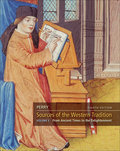
With a collection of over 350 sources, each accompanied by an introductory essay and review questions, this two-volume primary source reader emphasizes theintellectual history and values of the Western tradition. Sources are groupedaround important themes in European history--such as religion, education, andart and culture--so that readers can analyze and compare multiple documents. The Eighth Edition features additional sources by and about women, completely revised chapters on modern Europe and its place in the contemporary world, andupdates to introductions and review questions. INDICE: Part I: THE ANCIENT WORLD. 1. The Near East. 1. Mesopotamian Protest against Death: Epic of Gilgamesh. 2. Mesopotamian Concepts of Justice: Codeof Hammurabi. 3. Divine Kingship in Egypt: Hymns to the Pharaohs; Guidelines for the Ruler. 4. Religious Inspiration of Akhenaten: Hymn to Aton. 5. Love, Passion, and Misogyny in Ancient Egypt: Love Poetry; The Instruction of Ankhsheshonq. 6. Empire Builders: The Assyrian Empire, Inscription of Tiglathpileser I; The Persian Empire, Inscriptions of Cyrus and Darius I. 7. The Myth-Making Outlook of the Ancient Near East: Personification of Natural Objects; Lament for Ur, The Gods and Human Destiny. 2. The Hebrews. 1. Hebrew Cosmogony and Anthropology: Genesis. 2. Human Sinfulness: Genesis, The Origins of Sin. 3. The Covenant and the Ten Commandments: Exodus, The Covenant; Exodus, The Ten Commandments. 4. Humaneness of Hebrew Law: Exodus, Crime and Punishment; Leviticus, Neighbor and Community; Deuteronomy, Judges, Witnesses, and Justice. 5. God's Greatness and Human Dignity: Psalm 8; Psalm 104. 6. The Problem of Undeserved Suffering: Job, "[God] destroys both the blameless and the wicked." 7. The Ageof Classical Prophecy: Amos and Isaiah, Social Justice; Isaiah, Peace and Humanity. 3. The Greeks. 1. Homer: The Educator of Greece: Homer, The Iliad. 2. Lyric Poetry: Sappho, Love, Passion, and Friendship. 3. Early Greek Philosophy:The Emancipation of Thought from Myth: Aristotle, Thales of Miletus; Anaximander; Aristotle, Pythagoras. 4. The Expansion of Reason: Hippocrates, The Sacred Disease, The Separation of Medicine from Myth; Thucydides, Method of Historical Inquiry; Critias, Religion as a Human Invention. 5. Humanism: Pindar, The Pursuit of Excellence; Sophocles, Lauding Human Talents. 6. The Persian Wars: Herodotus, The Histories. 7. Greek Drama: Sophocles, Antigone. 8. Athenian Greatness: Thucydides, The Funeral Oration of Pericles. 9. The Status of Women inClassical Greek Society: Euripides, Medea; Aristophanes, Lysistrata. 10. The Peloponnesian War: Thucydides, The Melian Dialogue and The Revolution at Corcyra. 11. Socrates: The Rational Individual: Plato, The Apology. 12. Plato: The Philosopher-King: Plato, The Republic. 13. Aristotle: Science, Politics, and Ethics: Aristotle, History of Animals, Politics, and Nicomachean Ethics. 14. Hellenistic Culture: Universalism and Individualism: Plutarch, Cultural Fusion; Epicurus, Self-Sufficiency. 15. Greek Culture and the Jews in the Hellenistic Age: First Book of Maccabees, Jewish Resistance to Forced Hellenization; Philoof Alexandria, Appreciation of Greek Culture and Synthesis of Reason and Revelation. 4. The Roman Republic. 1. Rome's March to World Empire: Polybius, The Roman Army. 2. The Punic Wars: Livy, The Second Punic War: The Threat from Hannibal; Appian of Alexandria, The Third Punic War: The Destruction of Carthage.3. The Spread of Greek Philosophy to Rome: Lucretius, Denunciation of Religion; Cicero, Advocate of Stoicism; Cato the Elder, Hostility to Greek Philosophy. 4. Roman Slavery: Diodorus Siculus, Slaves: Torment and Revolt; Appian of Alexandria, The Revolt of Spartacus. 5. Women in Republican Society: Quintus Lucretius Vespillo, A Funeral Eulogy for a Roman Wife. 6. The Decline of the Republic: Plutarch, Tiberius Gracchus; Cicero, Justifying Caesar's Assassination; Velleius Paterculus, The Triumph of Octavian; Sallust, Moral Deterioration. 5.The Roman Empire. 1. The Imperial Office: Augustus, The Achievements of the Divine Augustus; Tacitus, The Imposition of One-Man Rule. 2. Imperial Culture: Virgil, The Aeneid; Ovid, The Art of Love; Juvenal, The Satires. 3. Roman Stoicism: Seneca, The Moral Epistles; Marcus Aurelius, Meditations. 4. Roman Law: Justinian, Corpus Iurius Civilis. 5. Provincial Administration: Correspondencebetween Pliny the Younger and Emperor Trajan. 6. The Roman Peace: Aelius Aristides, The Roman Oration, The Blessings of the Pax Romana; Tacitus, The Other Side of the Pax Romana. 7. Third-Century Crisis: Dio Cassius, Caracalla's Extortions; Petition to Emperor Phillip; Herodian, Extortions of Maximinus. 8. TheDemise of Rome: Ammianus Marcellinus, The Battle of Adrianople; Salvian, Political and Social Injustice; Saint Jerome, The Fate of Rome; Pope Gregory I, The End of Roman Glory. 6. Early Christianity. 1. The Teachings of Jesus: The Gospel According to Saint Mark; The Gospel According to Saint Matthew. 2. The Dead Sea Scrolls: The Qumran Community, The Community Rule. 3. Christianity and Greco-Roman Learning: Tertullian, What Has Jerusalem to Do with Athens?; Clement of Alexandria, In Defense of Greek Learning; Saint Augustine, AppropriatingPagan Learning and Institutions for Christian Ends. 4. The Persecutions: Persecutions at Lyons and Vienne. 5. Monastic Life: Saint Jerome, The Agony of Solitude in the Desert; Cassian of Marseilles, On the Dangers and Fruits of Solitude; Saint Benedict of Nursia, The Benedictine Rule. 6. Christianity and Society: Lactantius, Acquisitiveness as the Source of Evil; Saint Benedict of Nursia, The Christian Way of Life; The Apostle Paul, The Submissive Role of Women. 7. Jews in the Era of Early Christianity: Saint John Chrysostom, Christian Demonization of Jews; Rabbinic Judaism: Ethical Concerns. 8. Church and State: Pope Gelasius I, Letter to Emperor Anastasius. 9. The Christian World-View: Saint Augustine, The City of God. Part II: THE MIDDLE AGES. 7. The Early Middle Ages. 1. The Byzantine Cultural Achievement: Theophylact Simocattes, The Value of Reason and History. 2. Islam: The Koran. 3. Muslim Relations with Christiansand Jews: Legal Texts and Decrees: Restrictions on Dhimmis. 4. Jihad: SayingsAttributed to the Prophet: Ibn Taymiyyah, The Religious and Moral Doctrine ofJihad. 5. Islam and Greek Learning: Avicenna, Love of Learning. 6. Convertingthe Germanic Peoples to Christianity: Bede, History of the English Church andPeople; Einhard, Forcible Conversion
- ISBN: 978-0-495-91320-7
- Editorial: Wadsworth
- Encuadernacion: Rústica
- Páginas: 496
- Fecha Publicación: 31/01/2011
- Nº Volúmenes: 1
- Idioma: Inglés
